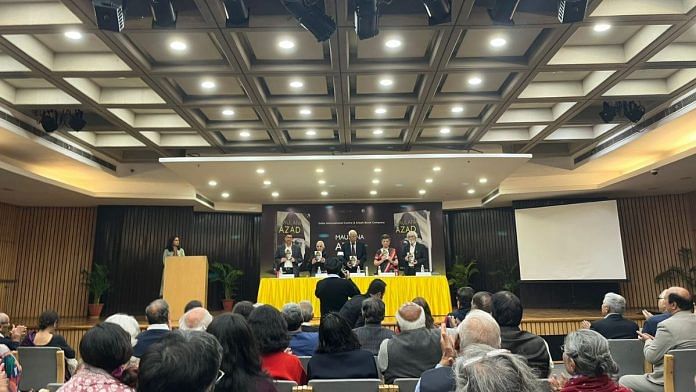On-time meant late at the book launch of Maulana Azad: a Life in Delhi’s India International Centre. “I thought I was delayed,” exclaimed someone in the packed auditorium a good half-an-hour before the event started at 6 pm on 18 February.
The invite asked guests to come half-an-hour before the event to enjoy tea and snacks. But even when one reached exactly at 5:30 pm, they were welcomed by an eager audience, already seated with copies of the book in hand. Such was the draw of Maulana Azad and S. Irfan Habib, science historian and author of the book, published by Aleph Book Company, at the centre of the evening.
“Nothing has been written about him for a long time and I felt it was important. His ideas and ideals are especially important in the context of today,” said Habib to ThePrint.
In the half an hour of waiting, old friends greeted each other from across the room with loud adabs. The audience was made up mostly of elderly intellectuals, who conversed in English and slipped into Urdu poetry with ease. There were also many students — a busload of people from Jawaharlal Nehru University, someone from the audience noted. They hovered around conversations, many with a notebook in hand, hoping to pick up a nugget of wisdom. A courageous few asked for selfies with the notable guests.
Also read: Marx, movies, memories—Saeed Mirza’s book on Kundan Shah, rats and the conspiracy of silence
An overflowing room
Once the event formally began, the room was overflowing. There weren’t enough seats for everyone.
The guests of honour — historian Romila Thapar, former Jammu & Kashmir Governor NN Vohra, political scientist Neera Chandhoke, playwright M. Sayeed Alam, and Habib — were called to the stage.
They were presented with a unique token of appreciation, tea. “Maulana Azad was very particular about his tea,” the emcee said as the guests were given blue tins of loose tea.
Habib did not get a tin; his token was something else that Azad cherished —his pen. It was given to the author by the freedom fighter’s grand-niece Husnara Salim.
“Habib sahab is a friend of the family and he spent many years writing this book. I flew down from Abu Dhabi to make it for the launch,” she told ThePrint.
The book was officially launched by Thapar, who called it a “pleasurable read.”
“What came through forcibly was his tremendous interest in education. It’s something we skirt around these days and never face as fully as we should,” she said of Azad, who was Independent India’s first education minister.
Thapar reminisced about the leaders of the freedom struggle saying that the people leading us then were intellectuals.
“This was a time when education ministers were highly educated,” Thapar said as the room erupted into laughter and applause. Almost every observation she made was met with claps from the audience.
Vohra noted how in his time as education minister and even after, Azad lobbied constantly to raise the education budget. “In the first year, it was only Rs 1 crore but by the time he died it had gone up to Rs 30 crore,” he noted.
Next on the dais was Habib. He began by thanking his many “ancient friends” who had come out to support him.
“This book is written in the context of today. It’s not frozen in history. History should be alive, all the thinkers of our past are,” he said.
Habib hoped that his book would bring the intellectual’s thoughts back into circulation.
Also read: ‘Leave rewriting history to historians’ – says Swapna Liddle at her book launch
Turning to Azad
Chandhoke spoke in broad strokes of history’s important role in resolving the political predicaments of the present.
She said that India’s national movement was Brahmanical and there were two pathways that nationalism took — civic and ethnic.
“The first was spearheaded by Nehru and the other, well we don’t have to utter his name. We don’t have to give him any importance. He had nothing to contribute,” she said to thundering applause, while she whispered his name—Savarkar.
She turned to Azad to find the answer to today’s political problems. “He advocated for keeping the personal and political separate. Religion is faith, not politics,” she said.
The panel concluded with Alam. Two clips from his play Maulana Azad, starring Tom Alter, were presented. It was a hit, with loud laughs and even louder applause.
“Many of the books that Azad wrote remain unknown. It’s high time that his work should be translated into multiple languages, by the National Book Trust and sold at nominal prices,” he said.
Alam was the only panellist who moved away from English and talked in Urdu. He connected with the audience instantly. There were echoes of “wah wah” around the room as he spoke.
“I don’t think some of the historians knew him [Azad] very well. What they said was very minimal. But what Sayeed said made a lot more sense, it really rang true,” said Meera, whose father Manubhai Shah was in the cabinet with Azad.
The event ended at 7:30 pm but the auditorium only cleared out half-an-hour later. Habib had done what he set out to do with Azad’s legacy — conversations flowed and numbers were exchanged with the promise of further discussion.
(Edited by Ratan Priya)



